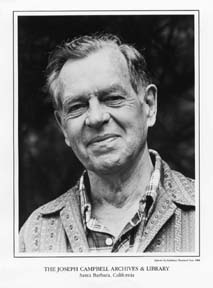
Joseph Campbell makes an important point in an interview with Bill Moyers:
One of our problems today is that we are not well acquainted with the literature of the spirit. We're interested in the news of the day and the problems of the hour. It used to be that the university campus was a kind of hermetically sealed-off area where the news of the day did not impinge upon your attention to the inner life and to the magnificent human heritage we have in our A great tradition--Plato, Confucius, the Buddha, Goethe, and others who speak of the eternal values that have to do with the centering of our lives. When you get to be older, and the concerns of the day have all been attended to, and you turn to the inner life--well, if you don't know where it is or what it is, you'll be sorry.I count myself as very lucky indeed to have received a liberal education. Even so, it's important for me to keep reading, to keep learning, to keep being open to the stories of other cultures. All of us can benefit from making such a commitment to ourselves.
Greek and Latin and biblical literature used to be part of everyone's education. Now, when these were dropped, a whole tradition of Occidental mythological information was lost. It used to be that these stories were in the minds of people. When the story is in your mind, then you see its relevance to something happening in your own life. It gives you perspective on what's happening to you. With the loss of that, we've really lost something because we don't have a comparable literature to take its place. These bits of information from ancient times, which have to do with the themes that have supported human life, built civilizations, and informed religions over the millennia, have to do with deep inner problems, inner mysteries, inner thresholds of passage, and if you don't know what the guide-signs are along the way, you have to work it out yourself. But once this subject catches you, there is such a feeling, from one or another of these traditions, of information of a deep, rich, life-vivifying sort that you don't want to give it up.

Let me first say that I am now retired and was just turned 69 this Oct. 20, and, next, that during the last few years on my job as a machinist, I would take some of Joseph Campbell's audio tapes of his lectures to work and play them. I would do the same with Steven J. Gould's tapes. I have tremendous respect for Campbell's ideas and the breadth and scope of his knowledge, but I almost see a contradiction in this lament for things of the past. How can one be open to the now, to real peace, if one is lamenting a lost world in which one imagines things were better? I constantly remind myself, when I am lamenting, that all through history people have yearned for the past nostaligically, but that the past, in honest reflection, is no better nor worse than the present. I am fortunate to be widely read, to have acheived a Masters Degree in English and an MFA in Creative Writing, but I am, because of that, one of the fortunate few whose genetic makeup and opportunity allowed me these acheivements. Throughout history, only a few men and women have been interested enough and been given enough opportunity to tap into the knowledge of the ages. It has always been just a few. It has never been the majority. Sometimes, when I listen to Campbell on Moyer's show, I hear the tones of a crotchety old professor. That tone belies his constant theme that we all must seek our own bliss. For some, that bliss is not found in books, but in the refuge of the forest with a rifle to hunt with or in climbing a sheer rock face in the mountains. Let us recognize that each person's bliss is individual and very few seek their bliss in academia.
ReplyDelete